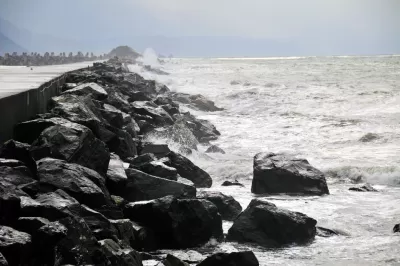U.S. coastal cities need to prepare for the effects of climate change, but the pot of funding is limited. There’s no way around the fact that there will be winners and there will be losers.

"As disaster costs keep rising nationwide, a troubling new debate has become urgent: If there’s not enough money to protect every coastal community from the effects of human-caused global warming, how should we decide which ones to save first?" writes Christopher Flavelle.
A new estimate finds that $42 billion will be needed to provide basic measures to protect cities with populations greater than 25,000 people by 2040. Including smaller cities with fewer than 25,000 residents raises the cost to $400 billion.
The funding needed will likely exceed what is available, and the federal government will face the inevitable task of determining which cities to save. The decision could be based on which investments will provide the best return. Another possibility would be to rank cities based on factors such as property values, historical and cultural significance, and contributions to the national economy, says Flavelle.
FULL STORY: With More Storms and Rising Seas, Which U.S. Cities Should Be Saved First?

Planetizen Federal Action Tracker
A weekly monitor of how Trump’s orders and actions are impacting planners and planning in America.

Chicago’s Ghost Rails
Just beneath the surface of the modern city lie the remnants of its expansive early 20th-century streetcar system.

San Antonio and Austin are Fusing Into one Massive Megaregion
The region spanning the two central Texas cities is growing fast, posing challenges for local infrastructure and water supplies.

Since Zion's Shuttles Went Electric “The Smog is Gone”
Visitors to Zion National Park can enjoy the canyon via the nation’s first fully electric park shuttle system.

Trump Distributing DOT Safety Funds at 1/10 Rate of Biden
Funds for Safe Streets and other transportation safety and equity programs are being held up by administrative reviews and conflicts with the Trump administration’s priorities.

German Cities Subsidize Taxis for Women Amid Wave of Violence
Free or low-cost taxi rides can help women navigate cities more safely, but critics say the programs don't address the root causes of violence against women.
Urban Design for Planners 1: Software Tools
This six-course series explores essential urban design concepts using open source software and equips planners with the tools they need to participate fully in the urban design process.
Planning for Universal Design
Learn the tools for implementing Universal Design in planning regulations.
planning NEXT
Appalachian Highlands Housing Partners
Mpact (founded as Rail~Volution)
City of Camden Redevelopment Agency
City of Astoria
City of Portland
City of Laramie





























